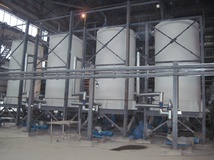Heat insulation of tanks
Tanks and reservoirs are widely used in many industries. Diverse use makes it necessary to solve different tasks during their heat insulation.
The most common problem is protection of tanks filled with lighter petroleum fractions (gasoline, kerosene, etc.) against overheating by sunlight. Lack of insulation of tanks can lead to serious problems, as oil products boiling point is about 40°C. Even in areas where climate is not so hot, metal in summer months is capable to warm up to 80°C, which leads to evaporation of the contents of tanks and vessels. The loss in this case can reach up to 40% of total volume. Economic losses resulting from this are obvious.
Equally important is the problem of insulation of tanks for storing ammonia, sulfuric acid, styrene and other reactive liquefied gases, which should not overheat at storing.
For industrial plants and energy facilities it is important to reduce heat loss during operation of storage tanks and deaerators filled with large amounts of hot water. Stable high temperature, required by the process regulations, should be maintained inside tanks with diesel fuel, fuel oil, used as backup fuel in industrial plants.
A large number of tanks and vessels are used for storage of process and drinking water (fire fighting containers, railway and road tanks), as well as fluids used in food and chemical industries (alcohol beverages, milk, vinegar, etc.). Temperature difference causes condensation problem, as well as quick aging of the metal surfaces.
Traditional insulation materials for tanks and containers are not effective enough: mineral wool and polyurethane foam require additional coating to protect against UV rays and moisture.
Moreover, installation of these materials is associated with significant efforts. During installation work, it is necessary to pump out the contents of the containers and to stop the production process. Moreover, metal surface of reservoirs should be treated with special anti-corrosive compositions.
Using Isollat insulation paint for insulation of tanks and containers solves the following problems at once:
- Additional coating to protect against UV rays;
- Condensation on metal surfaces: special additives in Isollat coating protect reservoirs and tanks against corrosion;
- Installation: applying liquid-ceramic coating using high-performance airless spraying units makes it possible to carry out coating within extremely short period of time without stopping the process and does not require installation of additional protective coating. Welding operation dangerous for petrochemical production in this case become unnecessary.
- Safety for human health, which allows wide use in food industry.
Advantages of Isollat insulation:
- it is liquid;
- small coating thickness;
- service life of the material is more than 10 years without loss of performance;
- environmental friendliness;
- possibility of combined use with other insulating materials (Isollat-Effect combination);
- short turnaround time;
- no welding needed;
- color matching is possible.















